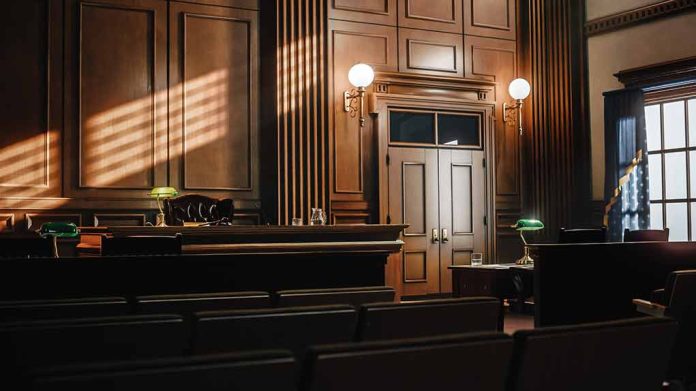
Uganda’s newest law authorizing military courts to try civilians signals President Museveni’s alarming power grab aimed at silencing political opposition ahead of upcoming elections.
Key Takeaways
- President Yoweri Museveni signed the UPDF Amendment Bill 2025 allowing civilians to be tried in military courts, directly contradicting a previous Supreme Court ruling.
- Opposition figures, including leader Bobi Wine, claim the law deliberately targets political opponents under the guise of national security.
- Military courts in Uganda have historically imposed harsher penalties and longer detentions than civilian courts.
- The law was passed amid an opposition boycott and heavy police presence, raising serious concerns about democratic processes.
- Legal organizations including Uganda’s Bar Association plan constitutional challenges against the controversial legislation.
Museveni’s Military Courts: A Tool for Political Control
In a concerning development for democratic governance, Ugandan President Yoweri Museveni has signed into law legislation permitting civilians to be tried in military courts. This controversial measure directly contradicts a previous Supreme Court ruling that declared such proceedings unconstitutional. The Uganda People’s Defence Forces Amendment Bill 2025 specifically targets civilians accompanying military units and those in possession of firearms or ammunition, effectively creating a parallel justice system outside standard civilian courts. With upcoming elections on the horizon, many see this as a strategic move to intimidate and neutralize political opposition through military judicial proceedings.
While government supporters claim the law aims to address armed criminals more efficiently, opposition figures and human rights advocates view it as a deliberate attempt to suppress political dissent. The timing is particularly suspicious as the country approaches another electoral cycle where Museveni, who has held power since 1986, faces mounting challenges to his continued rule. The government’s justification focuses on preventing political violence and addressing security concerns, but critics argue the vague language of the law provides excessive latitude for targeting legitimate political opposition.
Opposition Figures in the Crosshairs
Popular opposition leader Bobi Wine, who challenged Museveni in the previous election, has expressed direct concerns about being targeted through this legislation. “The act is targeting all of us in the opposition,” stated Bobi Wine. The opposition’s fears aren’t unfounded, as Ugandan authorities have previously used military courts against political rivals. The law was passed under suspicious circumstances, with opposition lawmakers boycotting the vote and a heavy police presence surrounding the parliamentary proceedings, reflecting the contentious nature of this legislative change.
Human rights lawyer Gawaya Tegulle has highlighted the concerning implications of this law for political opponents. “If you are a political opponent then they will find a way of getting you under the military court and then you know your fate is sealed… once there, justice will never visit your door,” Tegulle warned. This sentiment reflects widespread concerns that the government could plant evidence or fabricate charges to bring political opponents before these tribunals, effectively removing them from the political arena through extended detention periods.
Military Justice: Harsher and Less Accountable
Military courts in Uganda have earned a troubling reputation for imposing significantly harsher penalties and maintaining prolonged detention periods compared to civilian judicial processes. In a notable example, opposition figure Kizza Besigye was initially charged in a military court before being transferred to civilian jurisdiction after public outcry. The military justice system lacks many fundamental protections afforded in civilian courts, raising substantial concerns about due process and fair trial standards for those brought before these tribunals.
“If you are a political opponent, then they will find a way of getting you under the military cour,t and then you know your fate is sealed… once there, justice will never visit your door,” said Gawaya Tegulle.
President Museveni has publicly criticized the Supreme Court’s previous decision limiting military jurisdiction, demonstrating his preference for these tribunals when handling certain cases. Colonel Chris Magezi defended the new law, stating: “The law will deal decisively with armed violent criminals, deter the formation of militant political groups that seek to subvert democratic processes, and ensure national security is bound on a firm foundational base. If it ain’t broke, don’t fix it!” This rhetoric suggests the government views opposition political organizing as potentially criminal activity rather than legitimate democratic participation.
Constitutional Crisis and International Backlash
The Uganda Law Society and the country’s Bar Association have announced plans to challenge the constitutionality of this law, setting the stage for a significant legal battle. These legal professionals maintain that the legislation fundamentally undermines established rule of law principles and contradicts previous judicial determinations. The government claims to have addressed the Supreme Court’s concerns by requiring tribunal presiders to have legal qualifications and maintain independence, but critics remain unconvinced these provisions will prevent abuse.
International human rights organizations and United Nations officials have joined domestic critics in condemning the legislation. The law has drawn particular criticism for potentially violating international standards for fair trials and judicial independence. With Museveni’s increasingly authoritarian governance approach, this latest move signals a troubling acceleration in Uganda’s democratic backsliding and represents another concerning example of how leftist regimes around the world continually work to undermine judicial independence while consolidating power in the executive branch.




